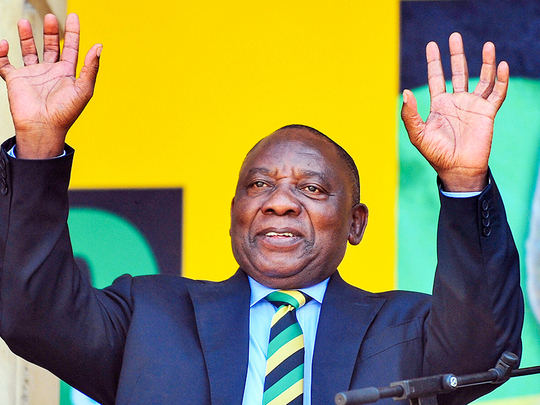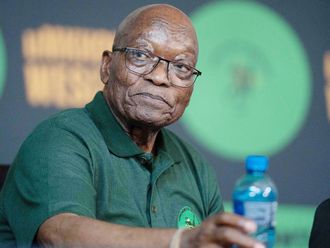
South Africa: Late on the evening of February 4, Cyril Ramaphosa and the five other top leaders of South Africa's ruling party went to President Jacob Zuma's Cape Dutch colonial-style residence in the capital, Pretoria. They shared a dinner of chicken, rice, oxtail and salad.
The message was less pleasant: It was time for the 75-year-old leader to go. Zuma, in power since 2009, dug in his heels.
"President Zuma basically said to us: 'I'm not going anywhere, I'm not convinced by you guys, I'm not going to resign’,” Paul Mashatile, the African National Congress' (ANC’s) treasurer-general, told mining executives in Cape Town on February 6. "We tried to persuade him, we spent a lot of time. At the end we said that's fine."
But it wasn't fine. Zuma's immersion in a succession of scandals had caused immeasurable damage to the ANC, once revered for the leading role it played in vanquishing apartheid, and had ground Africa's most industrialised economy to a near-standstill. With elections looming in 2019, the officials, who'd been chosen seven weeks earlier to lead the party, were adamant that he wasn't going to finish his second term.
Now Zuma is gone, announcing his resignation on Wednesday, and Ramaphosa was elected Thursday to replace him as president. The meeting at the presidential residence, it turned out, was a minor skirmish in a war whose victor had been decided in December.
This is the story of Zuma's downfall, and how his own number two made it happen.
Starting point
It began on December 16, when more than 4,000 delegates descended on the Nasrec conference centre in Soweto near Johannesburg for the ANC's national conference. Zuma's term as party leader was up and a new chief had to be chosen. With prosecutors circling to indict him on graft charges related to an arms deal in the 1990s, Zuma needed to ensure he had his successor's protection.
Party tradition dictated that the top job should go to Ramaphosa, 65, its deputy leader. He'd won international acclaim when he steered talks that ended apartheid and produced South Africa's first democratic constitution, and had served as the country's deputy president since 2014.
Instead, Zuma backed Nkosazana Dlamini-Zuma, his ex-wife and the mother of four of his more than 20 children. His confident demeanor in the lead-up to the gathering indicated that he thought she had the contest in the bag.
"He is the kind of character that does not just want to be classified among the top 10 or top five. Cyril always wants to be number one"
What Zuma hadn't counted on was three court rulings that disqualified about 100 of his allies from voting. Or on a decision by David Mabuza, a key power broker in the eastern Mpumalanga province, to switch allegiances shortly before the election. When Ramaphosa was declared the winner of the ANC presidency on December 18 with 52 per cent of the vote, Zuma sat stony-faced, pursed his lips and didn't applaud.
That was a turning point for South Africa. Ramaphosa became increasingly assertive over the next few weeks. He oversaw the appointment of a new board at the state power utility, which had been at the centre of graft allegations implicating Zuma's allies, wooed investors at the World Economic Forum in Davos and poured cold water on the president's plans to build new nuclear power plants.
"We have taken a view that this is a very, very difficult matter," Ramaphosa said, when asked in a January 25 interview with Bloomberg Television in Davos whether Zuma would serve out his term. "We are going to manage this transition very carefully. What we don't want to see is him treated with disrespect."
Ramaphosa had made clear where true power now lay, according to James Motlatsi, who helped him found the mineworkers' union in 1982 and is one of his closest confidants.
"He is the kind of character that does not just want to be classified among the top 10 or top five," Motlatsi said. "Cyril always wants to be number one."
Even before Davos, Zuma's power had ebbed, when members of the party's National Executive Committee (NEC) gathered at the Saint George hotel near Pretoria on January 19. The talks dragged on late into the night before it was agreed that he must leave office and the party's top six leaders must manage his exit, according to six senior party officials who spoke on condition of anonymity. Ace Magashule, the ANC's secretary-general and a close Zuma ally, insisted the next day that no decision had been taken on the president's future.
Zuma flew to Ethiopia to attend an African Union summit on January 26, where he spoke out against corruption. He returned home on January 30 and the ANC's top leaders tried to meet with him that evening. He kept them waiting for five days before agreeing to the dinner at his residence, according to ANC official Mashatile. His account of the negotiations was taped and leaked to the media.
Why the ANC is looking for a fresh start in South Africa
The president's truculence at that meeting appeared to have won him a reprieve until after his planned state-of-the-nation address on February 8, the highlight of the parliamentary calendar. The legislature and surrounding grounds in Cape Town were spruced up, red carpets were rolled out and tents were set up for broadcasters to do live crossings.
Then two days before the scheduled speech, parliamentary Speaker Baleka Mbete addressed reporters on the steps of the National Assembly and dropped the bombshell that the speech would be postponed, due to fears of violent disruption, she said. Zuma's office issued a statement saying he'd requested the delay due to "certain developments" that weren't conducive to holding a successful event.
The ANC then announced plans to convene a National Executive Committee (NEC) meeting on February 7 to discuss the transition of power, only to cancel it hours later after Ramaphosa had further discussions with Zuma at his Cape Town residence.
Ramaphosa issued a statement the next day saying the meeting had been constructive and the impasse would be resolved soon in the country's best interest. The government distributed pictures of the two men sitting side by side at a cabinet committee meeting in Cape Town, both beaming from ear to ear.
The seeming detente lasted until February 10, when the ANC's top six leaders held more late-night talks with Zuma. He again snubbed appeals to go graciously. The next day, Ramaphosa told a rally in Cape Town that the transition to a new administration would be finalised once and for all when the NEC met on Febraury 12.
That gathering, held once again at the Saint George hotel, lasted for 13 hours. The panel's members agreed that Zuma's time was up and Ramaphosa should replace him. Ramaphosa and Magashule left the gathering for an hour to meet with Zuma at his residence to inform him of the decision.
Zuma was awake when they arrived shortly after at 11pm and there were "very cordial" discussions, Magashule later told reporters. While Zuma said that while he was a disciplined member of the ANC and respected the NEC's decisions, he didn't want to go yet. The request was denied and Zuma was given "time and space" to reflect.
Zuma's exit ends 'one-man disaster' that roiled his nation
On February 14, the ANC's parliamentary caucus said it would pass a motion of no-confidence in the president the next day unless he quit. Zuma retorted in an interview with the state broadcaster that the process was unfair.
"I felt I am being victimised here," he said. "That is not the way we do things. You can't force the decision as it has been done now. Nobody has ever provided me with reasons. What is the problem?"
"The ANC should never be divided in my name," Zuma said. "Make no mistake, no leader should stay beyond the time determined by the people they serve."











